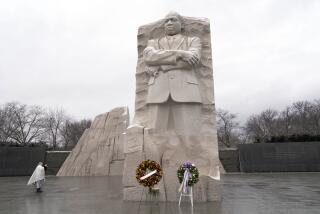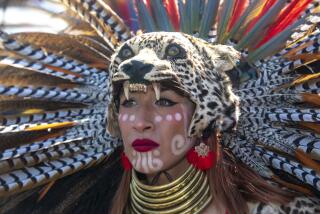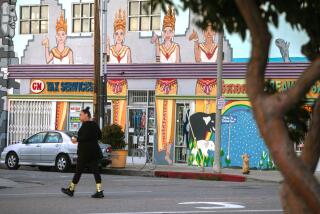Kwanzaa Celebration of African American Culture Kicks Off
- Share via
For some, the day after Christmas means great shopping and returning to work. But for others, it’s the start of a seven-day celebration of family, community and culture for more than 28 million people worldwide.
A black candle, one of seven sitting atop a kinara or candelabrum, was lighted Wednesday at a downtown Inglewood celebration, kicking off the start of Kwanzaa, an African American holiday, on its 35th year.
At the celebration, colorfully dressed dancers and drummers led a procession to Market and Kelso streets where participants played music, ate traditional African food, and told stories about the start of Kwanzaa and the principles behind the holiday.
“Once upon a time, there was a holiday called Kwanzaa,” a storyteller dressed in African garb read to about 20 children. “And once upon a time, there was a man named Maulana Karenga, the father of Kwanzaa.”
Karenga, a professor and chair of the blacks studies department at Cal State Long Beach, created the holiday 36 years ago to reaffirm and restore roots to African culture and to introduce seven principles that would strengthen and celebrate family, community and culture.
The celebration continues this weekend with the 25th annual Kwanzaa Gwaride Parade, which begins at Crenshaw and Adams boulevards at 10 a.m. Saturday and ends at Liemert Park.
“For me, this is bigger than the Rose Parade,” said Debora Morris, 41, also known as Ms. Clown, the Kwanzaa Clown. “It has the same magnitude to it, and I look forward to this celebration every year.”
The Pasadena resident said that dressing up as a clown gives her the opportunity to connect with children because they are the ones at whom the holiday is aimed.
“This is a holiday about self-discovery,” she said. “We need the children to get involved.”
Kwanzaa, Swahili for “first fruits of the harvest,” is characterized by the themes of unity, self-determination, collective work and responsibility, cooperative economics, purpose, creativity and faith on each of its seven nights, said Akile, a community activist and chairman of Kwanzaa People of Color.
The holiday is based on the theory of Kawaida, which espouses that social revolutionary change for black America can be achieved by exposing blacks to their cultural heritage.
“I can ask most African American people to tell me what the kinara or the mishumaa saba [the seven candles representing each day of Kwanzaa] is,” and most won’t know,” Akile said. “It is important to teach one another about the holiday and our culture.”
Just down the way, June Davis, 23, of Los Angeles let his curiosity get the better of him, and he walked over to see what the commotion was.
“I’m not going to lie,” said Davis. “I just learned what Kwanzaa is today [Wednesday]. It’s the day after Christmas, right.”
More to Read
Sign up for Essential California
The most important California stories and recommendations in your inbox every morning.
You may occasionally receive promotional content from the Los Angeles Times.













